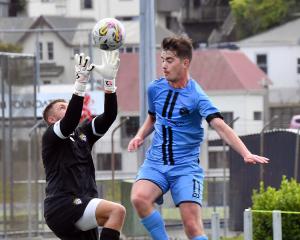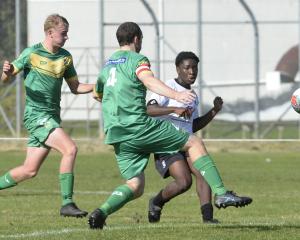Futsal will continue to flourish in New Zealand, says national coach Scott Gilligan, but the country still has some way to catch up with top countries around the world.
Gilligan, an Australian who has been involved in the sport ever since he started playing it as a youngster, has been in Dunedin for the past few days, coaching both players and coaches in the art of the game.
Futsal has come a long way since it was seen as a casual kick around when it was too wet or cold to train outdoors.
It is played on an indoor court, the same size as a basketball court, with five players, including a goalkeeper, in each side.
It is now a sport in its own right and has enjoyed a huge surge in popularity in New Zealand, with 23,500 people now playing the game around the country, up from a few hundred four years ago.
Gilligan, who still lives in Sydney, said there were a few reasons why the sport had caught on.
''When you are paying football and you might be a young kid in an 11-a-side, if your team is no good and you are a striker you never get to see the ball. Same if your team is good and you are a defender. You never get the ball,'' he said.
''But in futsal, with it being five-a-side on a small court, players are always involved in the game, having to switch from attack to defence.
''It is like a disease. It is a very infectious game.
''And it is an easy game to play. The ball does not bounce, so it is much easier to control. The ball is not bouncing all over the place.''
One advantage for futsal in New Zealand was football bosses in this country had got completely behind the sport and recognised its value, which had not always occurred in other countries, he said.
The top futsal countries, which were much the same as the top footballing nations, such as Brazil and Spain, emphasised futsal to younger players, as it improved their skills.
''On a world stage we are still quite a way behind. But give me another five to 10 years working away and we'll be hopefully in there.''
Gilligan (50) said in Brazil, players aged 5-14 played futsal before moving to football. In Brazil there were four times as many futsal players than footballers because of the emphasis on upskilling players first.
He had spotted some talented players in Dunedin and said the national league was improving the standard of players. A women's national league was planned next year.
''What we notice is with a lot of the older players they are set in their ways somewhat. But some of the young guys coming through have some great technical skills.''
Because futsal was such a fast game it needed quick players with good skills and who could operate under pressure.
Gilligan had previously coached the Australian national team for eight years and then conducted coaching courses and helped coach teams in Asia and the South Pacific.
He took seven months off in 2010 when his son was involved in a car accident and when he wanted to get back into the game he was wooed by New Zealand Football.










